Pedagogical ramble with the fish ruler and the soda can fish poster
by Abibou DIOP, Principal of the CEM Cayar
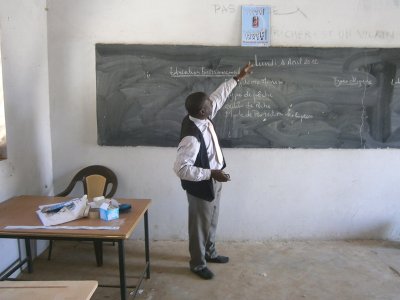
As part of its outreach and training activities for its members, all students of the CEM Cayar, the Mundus maris Club held its first art and education activity during the weekend of April 14th and April 16th. This consisted of a painting workshop programme supervised by the artistic director of the club, Ababacar Ndoye. A. Ndoye is a sculptor and painter, who has long supported the club.
The theme for this workshop was overfishing. A preliminary presentation was given by Mr Oumar GADIO, supervisor of the school, who had participated in the project seminar Mundus maris / FAO - EAF Nansen for the integration of education for environmental protection into the ordinary curriculum. More than 40 pupils attended the presentation, which also included a practical demonstration of the use of the fish ruler.
This ruler is a component of the educational kit, a set of inputs to currently being tested for their usefulness as teaching aids. It serves as support in education for the protection of the marine environment.
On Saturday, April 14, 2012 starting at 15h, the budding artists joined the Workshop of Painter Ababacar Ndoye Badou, who oversaw the first phase of the work of the troop of 8 girls and 12 boys. Each pupil sketched a picture on the theme of the day.
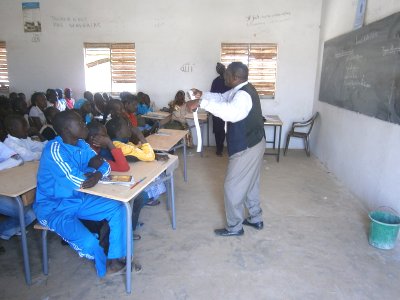
It was a real pleasure to ramble along the fishing pier for the use of the fish ruler and giving explanatory sessions on good fishing practices with emphasis on mature specimens fit for human consumption.
These were identified thanks to the measurements made with the fish ruler of length and width. Various species have been measured with the ruler and students were to assess certificates of cleanliness for the catches and and to determine whether they were fit for consumption according to the procedures established for the different species examined in the sample. The students held small meetings to explain to fishers, fish traders, vendors and conveyors.
The funniest moment was when a gentleman and a lady who, taking the young visitors to the fishing pier for people of great influence with the political authorities, were quick to ask that their complaints about the disappearance of the sardinellas they now buy expensively from Mauritania, are brought to attention of the President of the Republic or the Minister.
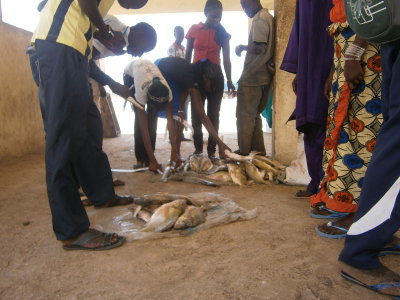
The little band took a pleasure from time to time to explain to people encountered on the fishing pier the importance of the fish ruler to certify the legality of the capture or not according to prescribed standards on the fish ruler.
The soda can fish poster with its slogan "Little fish becomes big if allowed to live" was also used by Mundus maris club members. This served as support for explanations to the public that seemed to fully appreciate our visit.
It is noteworthy that at the time of this activity, the fishermen in Cayar threaten to mount a punitive operation against fishing vessels that operate offshore.
The story of this educational ramble will be further illustrated by photographs taken on the occasion.
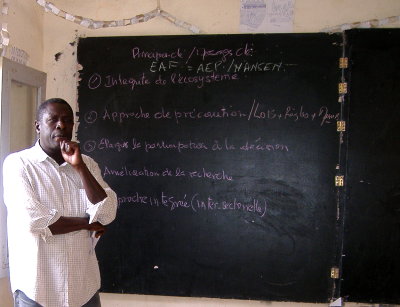
Meanwhile, additional follow-up work has been carried out together with the coordinator, Aliou Sall. In particular, an intermediary review has been carried out to see how the five key principles of the EAF Nansen approach have been reflected in the live tests in the school environment. They are:
- maintain ecosystem integrety (no fish is an island)
- precautionary approach to fisheries and other use of marine and coastal ecosystems and respecting the rules
- broad stakeholder participation
- promoting sectoral integration and safeguarding livelihoods
- investing in research and knowledge
These principles have been further articulated in the actual teaching modules in school.
Visualisation techniques have been used to support the understanding of the pupils. These have been reviewed during the follow-up session among the teachers and the coordinator and been further developed in a step-by-step manner.
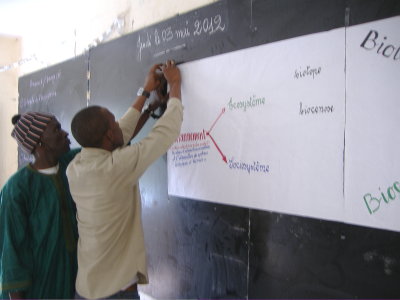 They also went hand-in-hand with consultations with external expertise, such as responsible persons from the fisheries research institute in Dakar, the manager of the marine protected area and others.
They also went hand-in-hand with consultations with external expertise, such as responsible persons from the fisheries research institute in Dakar, the manager of the marine protected area and others.
Exercises with the fish ruler were moreover a welcome opportunity to engage with local fish mongers and other professionals.
The conversations with old fishermen testified to the speed of environmental degradation in the last years and their negative effects on the social and economic conditions of the fishers.
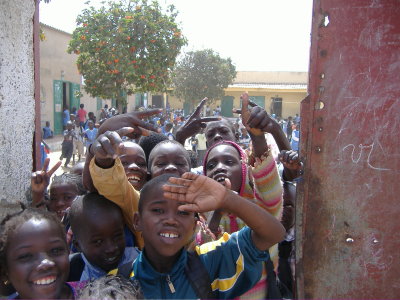 For the young kids - here a short during a break at school - this poses particular risk. Unlike in the past, the future for many may not be primarily in the fishery and the postharvest activities, but in other areas.
For the young kids - here a short during a break at school - this poses particular risk. Unlike in the past, the future for many may not be primarily in the fishery and the postharvest activities, but in other areas.
One hopes that the school and other learning opportunities offer them pathways to earn a place in adult life that is compatible with rebuilding degraded marine ecosystems and diversifying the economic activities - inside and outside a well-managed fishery.
Click here to see the testing programme in participating schools in Senegal.








